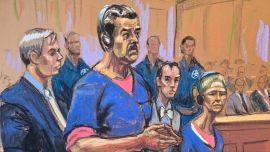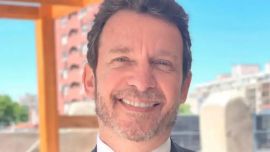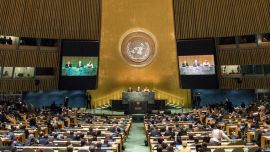Parts of Rosario were turned into something of a ghost town on Monday as four drug-related murders scared residents and shut down activity.
No taxis were running, nor buses, while many schools were shut in Argentina's third-largest city. Waste collection services were not running, petrol stations were closed and healthcare providers shut their doors.
Violence from criminal gangs is behind the shutdown. In the past week, two taxi-drivers had been murdered, as well as a bus-driver and a young worker at a petrol station.
Expressing their anger at the situation, residents staged pot-banging cacerolazo protests demanding greater security measures be taken.
Responding to the crisis, President Javier Milei’s national government said it would send federal security forces to the violence-plagued city. Officials also said they would send an Italian-style "anti-mafia" bill to Congress to clamp down on organised criminal gangs.
National Security Minister Patricia Bullrich announced on Monday at a press conference a "police saturation" plan to secure areas and the reinforcement of 450 troops from the federal security forces to prevent Rosario from becoming a "land of narco-terrorists.”
The official also confirmed that an "anti-gang" law had been sent to Congress which "typifies a new modality of criminal prosecution, taking the crimes of these gangs and assigning them to all their members.”
Ghost town
After the weekend shooting of a gas station employee, which followed in the footsteps of three other murders in the past week, Rosario woke up Monday without buses or taxis running, with petrol stations closed and rubbish piling up on the streets.
After the death of a gunned down driver was confirmed, the halting of buses and taxis was also confirmed on Monday, the latter until 6 am in principle, also given the mass closing of petrol stations amid the wave of violence.
“Given the death … there will be no urban and intercity transport tomorrow. Our hearts go out to ther victim’s family during this difficult time,” said the regional Rosario branch of the UTA transport union in a statement.
School principals decided not to hold classes after the crimes that provoked "panic" in the population, which the government attributes to a "reaction" of imprisoned drug lords to the hardening of their conditions of detention.
On Monday, the AMSAFÉ teachers’ union confirmed the “total halting of activities” in the wake of “urban terrorism” and “the escalation of criminal violence.”
Announcing the shutdown of public schools, teachers also criticised “the provocation and violence of the provincial government which have only made the situation worse.”
“For years repressive measures have been tested, as well the successive deployment of federal troops which have given no answers and have obviously failed,” read a statement.
"Families, we have decided to suspend classes i-person for tomorrow only," was the WhatsApp message that parents at the Francisco Gurruchaga school received on Sunday. "We must take shelter in the face of everything that is happening".
"I wouldn't have sent her anyway," said Romina Manzoni, a 44-year-old employee and mother of a pupil at the school, referring to her daughter. "It's very scary, everything that's happening.
‘Fear and concern’
Alejandro, a 48-year-old shopkeeper who did not want to give his surname for fear of reprisals, decided to open his business in Rosario along with a group of colleagues in the central Echesortu neighbourhood, although in other areas the shutters remained down for fear of an attack.
"Although we opened with fear and concern, the question was to feel free and not to give these people the pleasure of having everything closed," he said. "The economic aspect also plays a role, having the shop closed for one or two days means a lot of expenses in the midst of this economic crisis."
Secretary of the waste-collection union, Marcelo Andrada, announced that there would be no service on Monday.
The measure, he pointed out, is “in solidarity with the family of the bus driver who died and the taxi drivers attacked this week, all victims of consolidated violence in town.”
Amid the violence and the series of mafia-style hits, there was a noisy pot-banging protest late Sunday evening in most neighbourhoods in town. The city centre, in addition to the neighbourhoods of Martin, Pichincha and Echesortu were some of the areas where the protest was the loudest, according to the Rosario 3 news portal.
Rosario is Argentina's third-largest city, with a population of 1.3 million, and situated on the Paraná river. It has become a hotspot for the movement of drugs from Bolivia, Brazil, and Paraguay headed to Europe and Asia.
The city has the worst homicide rate in the country: 22 per 100,000 inhabitants, five times the national average.
– TIMES/PERFIL/AFP




















Comments